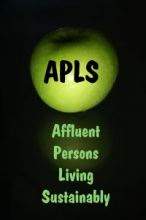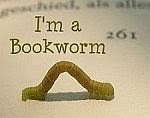The big day is finally here - our first ever
APLS blog carnival! I am thrilled to have the honor of hosting, and equally pleased with the absolutely amazing response we've received to the first topic -
What does living sustainably mean to you?The answers were surprisingly more varied than I might have expected - I encourage you to take the time to look at each and every post if time allows.
The highlights, in no particular order:
Lori at Life in Webster Groves starts us at the beginning, walking us through the various definitions of the word "sustainable" and and explaining, quite eloquently, how those of us who self-describe as APLS meet the criteria for each of those subtly varying definitions.
Green Resolutions uses the analogy of parenting to illustrate the point that the question of what constitutes sustainable living is one that has to be answered by each family based on their unique situation.
Farmer's Daughter approaches the question from a teacher's point of view and looks at personal sustainability through the textbook Four Basic Principles of Ecosystem Sustainability to share what sustainability means for her.
Green Bean very convincingly argues that a sustainable lifestyle is not the same thing as a self-sufficient lifestyle, but rather that the sustainable lifestyle actually leads to an embracing of other members of our community and building of relationships.
Eco Burban Mom explores how living in our disposable world actually keeps us busier than a more sustainable lifestyle, and opts to trade more stuff for more time.
Surely You Nest gives us permission to embrace (or at least periodically snuggle with) our inner junk food lover - and tells us why it's not necessarily incompatible with living sustainably - I for one appreciate that!
Arduous explores balance and compromise in relation to sustainability, and acknowledges the importance of recognizing what works for you and your lifestyle, so that the changes you make can be long-lasting.
Going Green offers pictures (and oh what pictures they are!) to answer the question - along with the now expected healthy dose of levity and humor, of course.
Simple-green-organic-happy answers the question in a delightful manner, couching her answer in the context of a wonderful children's novel,
Mrs. Frisby and the Rats of NIMH - I've ordered a copy to re-read already!
Chez Artz reminds us that sustainability is a continuum and that walking down the road gradually is okay.
Fake Plastic Fish avoids almost all mention of plastic (or fish, for that matter) and discusses the importance of awareness while attempting to live more sustainably.
Civic Lessons discusses her history as a small "e" environmentalist, her desire to be a big "E" environmentalist, and the joys of being called a dirty hippy.
Mindful Momma explains that trying to keep up with the Joneses isn't always such a bad thing - especially if the Joneses are living more sustainable lives.
Going Green Mama explains how sometimes sustainability can be forced by circumstances beyond our control, but no matter the route, a sustainable lifestyle is often a much happier lifestyle.
One Size Fits All discusses the concept of "enough" and how a true understanding of what this means can help lead to a more sustainable lifestyle.
Heather at Simple Green Frugal discusses the importance of recognizing your place in the grand scheme of things, the fact that living more sustainably is a process, not just a decision, and acknowledges that the "why" of living sustainably may be different for each of us.
Melinda at Elements in Time challenges us to prove that we can change our unsustainable behaviors without being faced with a major disaster or crises, and to look at sustainability in all aspects of life, such as body, food, and products.
The Purloined Letter probes the link between justice and sustainability and provides an excellent analysis of Richard Heinberg's axioms on sustainability.
Greenfluencer makes an analogy between sustainability and dieting, and encourages us to consider whether our newly adopted behaviors can be continued indefinitely, and to make sure we ease into things at a pace that's right for us.
Greeen Sheeep illustrates how sometimes, when everything gives, we can be unexpectedly blessed with a more sustainable lifestyle.
Lynn at Organic Mania is striving to live more sustainably, even if her son does think she's a meanie, and even if it means a little more planning and organization.
What's Your Name, Mommy? reminds us that living sustainably is a practice, not a competition - and if it stresses us out, it's not sustainable.
Inner Monologue of a Madwoman explores sustainable living against the backdrop of Christianity and finds that the two are very compatible.
Crstn85 has been watching the Olympics and thinking about sustainability on a global scale.
Organic Needle offers a beautiful look at the ways in which sustainability has led to a happier life for her and her family - a life that is rich with both connections and experiences.
Simple Living in a Complex Society examines how small steps compound each other and can have larger impacts than we might have expected - but we must decide to take the small steps.
Bobbi at To Live Local walks us through the major phases of her life to share how she's arrived at her current state of synthesis between her economic, political, and social values.
Home Is... shares how her path to a more sustainable lifestyle began when she realized that she was a part of the problem, not the solution - and then began working to change that.
Will at Green Couple explores the differences between local and global sustainability, and looks at how a focus on money can lead us down that path via the king of the 3Rs, Reduce.
Green Arizona looks at sustainability through the lens of health concerns, and reminds us that education is the key.
IB Mommy wants to be a sustainable pirate (and yes, there is such a thing, as she shows us!)
VWXYNot outlines some of the changes she's made on her path to sustainability - and turns out to be a much darker shade of green than she gives herself credit for, in this APLS opinion!
Greene Onion also shares some baby steps being taken towards sustainability, recognizing that gradual change is most likely to be lasting change.
Ecoinhabitant looks at sustainability in the context of our alignment with nature.
Mother Earth shares with us some of the ways she is working to achieve sustainability in both her personal as well as her professional life, and reminds us of the importance of maintaining flexibility in how we define things.
and, last but not least,
Kneedly Knots reminds us of the importance of a balance of giving and receiving, and ethics in our quest for sustainability.
That wraps up this month's APLS blog carnival - don't forget to check out the
Facebook Group, and of course the
APLS blog page to catch up on all sorts of other exciting activities going on! If you haven't been added to the Bushel Basket yet, please leave a comment letting us know that you'd like to be included, and we'll toss you in!
THANK YOU to each and every contributor who took the time to write such thoughtful posts - you've helped to make this first APLS blog carnival an overwhelming success!










